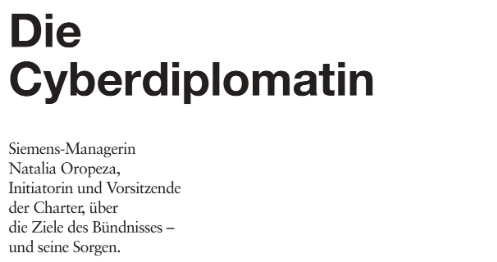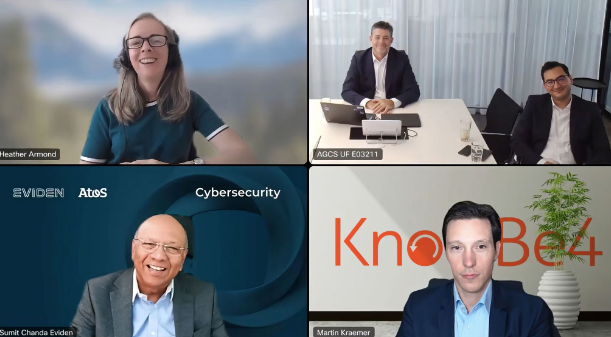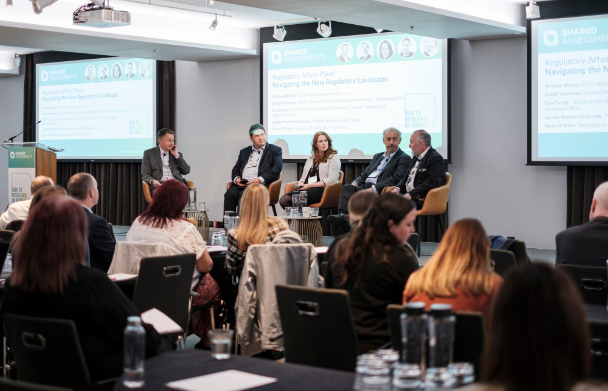IBM, together with several Partners of the Charter of Trust launched an initiative earlier this year to build the Charter’s threat information sharing capability related to digital infrastructures and the IoT supply chain.
By Nick Rossmann, Global Lead for Threat Intelligence, IBM Security X-Force
My team at IBM, a Partner of the Charter of Trust, discovered a malicious cyber operation in which a currently unknown adversary masqueraded as one of the world’s largest cold-chain providers in a global email phishing campaign seemingly aimed at spying on entities essential to the global distribution of Covid-19 vaccines.
From the onset of the pandemic, Covid-19 phishing emails have been one of the most prolific scams observed by the security community this year. Since late-January, attackers have duped recipients into opening emails with subject lines related to the novel coronavirus. Victims the world over, living in fear of the pandemic and its health and economic impact, received these emails and were enticed to click on their infected links and attachments. Doing so has led to compromises of individual devices and corporate networks, and ultimately to the theft of personal and company data. The fact that more employees are working from home during the pandemic, lacking in many instances sufficient cybersecurity protections, has exacerbated this threat and increased the need for organizations to take measures to address these security risks and be on alert.
The hackers claimed to represent Qingdao Haier Biomedical Co., a China-based company and one of the world’s largest cold-chain suppliers, making equipment to store and deliver materials at cold temperatures. In at least one copy of the spam email, the fake Haier representative sought to purchase about 500 vaccine refrigerators to bolster their temperature-controlled logistical services. The user, who purports to serve as Haier’s project manager in Africa, promised a $220,000 upfront payment, according to an email provided by the IBM security researchers. Attached to the email is a draft contract entitled, “RFQ – UNICEF CCEOP and Vaccine Project.” But the HTML attachment was actually a malicious file that, if opened, would prompt the recipient to share their secret login credentials with the attacker.
IBM’s security team has been researching Covid-19-related cyber-attacks and sharing with the Charter of Trust threat information sharing network since the early days of the pandemic. Based on the sophistication of this attack, which targeted a variety of industries related to vaccine storage and delivery before hackers cleaned up their digital footprints, researchers believe the campaign was launched by a nation-state, but declined to speculate on which one.
It’s unclear if any victims fell for the scam. But if they did, the harvested credentials could help an attacker “gain insight into internal communications, as well as the process, methods and plans to distribute a Covid-19 vaccine.
As pharmaceutical companies and governments the world over prepare for the logistical puzzle of disseminating hundreds of millions of vaccines to help blunt the coronavirus, cyber-criminals continue to leverage the urgency and despair of the global pandemic for intelligence and monetary gain. In this case, the phishing scheme spanned six countries and targeted European organizations that bolster immunization in poor countries.
In late November, the Atlanta-based cold chain company Americold Realty Trust said it was the target of a cyber-attack. The company believes the attack has been contained, but hadn’t “completed its investigation,” Americold said in a Nov. 30 regulatory filing. The company didn’t expect the hack to impact operations. Americold didn’t respond to requests for comment on the scope of the attack and the role email phishing may have played.
“As we shift toward distributing a vaccine for Covid-19, the logistics of this operation will become extremely critical,” said John Hultquist, a senior director at the cybersecurity firm FireEye Inc. “Seemingly mundane security issues could have major repercussions to such a complex and important effort.”
As Pfizer Inc. and Moderna Inc. work with U.S. and global regulators to approve their Covid-19 vaccines for emergency use, global distribution has already started. Pfizer and United Airlines transported the first mass air shipment of a vaccine from Brussels to Chicago in late November.
Pfizer’s vaccine must be stored at ultra-cold temperatures to avoid contamination. But maintaining temperature controls once a vaccine leaves the airplane remains a challenge. In parts of West Africa, for instance, temperatures in mid-December range from 70 to 90 degrees Fahrenheit. Even states in the U.S. lack necessary capacity to store large volumes of the vaccine without spoiling. This makes cold chain companies like China’s Haier essential to global distribution.
It also makes them prime targets for spoofing campaigns, said Claire Zaboeva, Senior Cyber Threat Analyst at IBM’s Security X-Force. Targets of the phishing operation have included the European Commission’s Directorate-General for Taxation and Customs Union, according to IBM. The agency is responsible for streamlining customs and duties as goods travel across the European Union. Attackers may see the agency as a single point of compromise to disrupt distribution across the region. Petrochemical companies were also targeted, since they produce dry ice to keep vials cool.
This was a well-prepared, precise, sophisticated campaign. We can’t ignore the fact that there are actors who will benefit from disrupting distribution of the vaccine. If an actor could disrupt consumer trust in the vaccine, that could play a pivotal role in changing perceptions of world power.
Raising cyber security resilience through collaboration between partners, is becoming a key objective for most companies. That is why IBM, together with several Partners of the Charter of Trust launched an initiative earlier this year to build the Charter’s threat information sharing capability related to digital infrastructures and the IoT supply chain. One of the first deliverables was to share threat information relating to Covid-19 and this case shows how relevant this topic is. The Charter of Trust has in parallel developed baseline security requirements for the supply chain, and this case also shows that such baseline requirements need to be complimented by security awareness since the methods used by adversaries evade normal security measures.
The more information on threats organizations, institutions and governments have access to, the better they can prepare to defend against them – making collaborative initiatives such as the Charter of Trust’s threat sharing platform, essential to thwarting off cyberattacks and safeguarding our digital environments.


You may also like

Chairwoman Natalia Oropeza in Brandeins Magazine
In an interview with Dorit Kowitz, Natalia dives deep into the pressing issues facing the cybersecurity landscape, explaining how the Charter of Trust bundles the expertise of different businesses across several regions to stay resilient in the face of evolving threats. As Natalia Oropeza says: "We all win if cybercrime doesn’t win."
Here are three key insights from her interview:
🔑 Collaboration is essential: No single organization can tackle cyber threats alone. The Charter of Trust is a prime example that businesses nowadays are more transparent when it comes to attacks and that sharing information in this field can be beneficial.
🔑 Addressing the digital skills gap: The Charter of Trust is working to address the global shortage of cybersecurity professionals by encouraging diversity and actively promoting opportunities for women to join the field.
🔑 Unified regulations: Harmonizing global cybersecurity standards will reduce vulnerabilities, helping businesses and governments combat threats more effectively.
The full interview is available here: https://lnkd.in/gRm6ZDGC


Cybersecurity Awareness Month
The complexity and urgency of this topic gathered a lot of interest, with 600+ attendees throughout the whole panel, which was composed of Jon-Paul Jones, COO at AZ Commercial, Firas Ben Hassan, GenAI expert & Manager of AllianzGPT at AZ Technology, Dr. Martin J. Krämer, External Security Awareness Advocate at KnowBe4, and Dr Sumit Chanda, Global CISO at Eviden & Chair of the Global External Engagement Working Group at the Charter of Trust.
We are pleased to see Dr. Sumit Chanda from Eviden bringing in his unique CISO insight on what these emerging technologies mean in day-to-day cybersecurity practices and bringing in the Charter of Trust perspective on this topic as well.
Thank you, Ervin Cihan and Haydn Griffiths for inviting other CoT Partners and for the great initiatives that Allianz is putting together within this year’s Security Awareness Month. And special thanks to Heather Armond for the great moderation.


UK/EU Summit - “Risk to Resilience”
💡Under the theme “Risk to Resilience” the first event of this series was held in London and brought together professionals from different industries and regions. Detlef participated in the panel about the complex regulatory landscape and emphasized that new legislation like the EU AI Act, DORA and Hashtag#NIS2 continue to push the standard of care on cybersecurity and other risks.
Thanks to Shared Assessments for organizing such an amazing event and inviting the Charter of Trust to participate in this high-class panel alongside Andrew Moyad, CEO at Shared Assessments.



